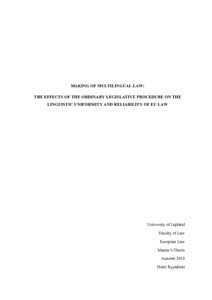Making of multilingual law : the effects of the ordinary legislative procedure on the linguistic uniformity and reliability of EU law
Ryynänen, Heini (2014)
Ryynänen, Heini
Lapin yliopisto
2014
restrictedAccess
Julkaisun pysyvä osoite on
https://urn.fi/URN:NBN:fi:ula-201409231396
https://urn.fi/URN:NBN:fi:ula-201409231396
Tiivistelmä
The aim of this thesis is to find out the effects of the ordinary legislative procedure on the linguistic uniformity and reliability of EU legislation. This thesis utilizes a legal linguistic approach to the topic. The development of EU legal language(s) is examined by using a method of legislative studies in the European Union context. This is done by examining how EU law is drafted and translated and whether the measures to secure the interlingual concordance of all the language versions are sufficient.
Equal authenticity of all the language versions guarantees the equality of Union citizens and access to EU law. Legal certainty as a common principle to all the Member States and as a fundamental principle of the European Union necessitates a certain level of clarity, stability, intelligibility and predictability from EU legislation. Fulfilling these requirements is highly challenging in the multilingual surroundings of the EU.
Several factors contribute to the linguistic uniformity of EU legislation. Most important ones of these are drafter’s nationality and linguistic capabilities, the legal knowledge of the translator, the duration of the legislative procedure, the compliance of the drafting rules and the awareness of the special problems that lawmaking in multiple languages confronts.
Meeting the requirements of legal certainty in every official language can be viewed as a criterion for adequate consistency of the language versions. The corrigenda published in the Official Journal of the European Union and the case law of the European Court of Justice imply, however, that the legislative procedure as it is today, cannot guarantee the concordance of all the language versions in that sense.
Equal authenticity of all the language versions guarantees the equality of Union citizens and access to EU law. Legal certainty as a common principle to all the Member States and as a fundamental principle of the European Union necessitates a certain level of clarity, stability, intelligibility and predictability from EU legislation. Fulfilling these requirements is highly challenging in the multilingual surroundings of the EU.
Several factors contribute to the linguistic uniformity of EU legislation. Most important ones of these are drafter’s nationality and linguistic capabilities, the legal knowledge of the translator, the duration of the legislative procedure, the compliance of the drafting rules and the awareness of the special problems that lawmaking in multiple languages confronts.
Meeting the requirements of legal certainty in every official language can be viewed as a criterion for adequate consistency of the language versions. The corrigenda published in the Official Journal of the European Union and the case law of the European Court of Justice imply, however, that the legislative procedure as it is today, cannot guarantee the concordance of all the language versions in that sense.
